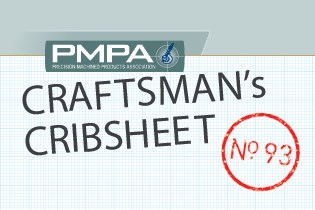Finishing Services that Remove or Reshape the Component Surface
Cribsheet provided by PMPA member Pioneer Service Inc., Addison, Illinois

There are several surface finishing techniques that “remove or reshape the surface layer” of a precision machined component. These finishing techniques can be applied to a wide variety of materials and provide increased durability, tighter tolerances, better aesthetics and improved functionality for many applications.
Electropolish
Electropolish is a polishing process that uses an electrical current to remove material from the surface of a machine component. This process improves the surface finish by leveling out the micropeaks and valleys on the surface layer of metal created during the machining process. It is the opposite of electroplating, in which a current is used to add material to the surface of a machined component to level out the surface layer.
Grinding
Grinding is a process that uses an abrasive grinding
wheel to remove material from the surface of the precision-turned component. This improves the surface finish and provides extremely accurate dimensions for a wide variety of applications. Depending on the geometry of the turned component, centerless or centered grinding may be used to complete the finishing process. Grinding can be done on the outside diameter (OD), inside diameter (ID) and a variety of types of features on the components (for example, holes, slots and flats).
- Honing is a subset of grinding, used on the ID of a precision machined component. It is more like a polishing process than a true grinding process. The honing process uses a rotating stone (hone) with a fine abrasive to remove/polish a fine layer of the surface material.
- Lapping is also a subset of grinding, which is used on the OD of a precision turned component to improve the surface finish and provide tighter dimensional controls. In this process, the abrasive material is in a paste form applied to a lap plate, and the component is passed against the plate to remove/polish the surface layer.
Pickling
Pickling is a chemical treatment that removes material from the surface layer of the metal. For precision machined components, it is most often used to clean (remove) the surface scale created during the heat treatment process. Components are dipped in an acid bath that dissolves the oxide scale from the surface level of the part.
Tumbling and Vibratory Finishing
Barrel tumbling is a process that uses various sizes and types of tumbling media in a rotating barrel to rub against the surface layer of the components. This removes excess material and burrs, can harden the surface, polish out machining marks, and brighten and burnish the parts. The size and type of media used will vary depending on the material of the component, its geometry (size and features) and final requirements. Tumbling media can be made of metals, ceramics and plastics, and come in a wide variety of sizes and shapes. Similar to tumbling, turned components are put into a tub-like machine that has vibratory media in it. The tub is vibrated so the media jostles against the part to remove surface marks and burrs, and result in an improved finish. Vibratory finishing is used more often than barrel tumbling for turned components due to the complexity of features and tight tolerances of the parts.
— PMPA member Pioneer Service Inc.
Related Content
Craftsman Cribsheet No. 128: Why Do Machinists Say Tenths Instead of Ten Thousandths?
In machinist parlance, a tenth is a tenth of a thousandth, not a tenth of an inch.
Read MoreCraftsman Cribsheet No. 129: How to Beat the Heat
Shops tend to heat up in the summer. Here are some tips for staying cool in the warmer months.
Read MoreCold-Drawn Steel Barstock: How It Is Manufactured, Benefits to Your Shop
Understanding the benefits provided by cold-drawn steel barstock can help you optimize the work you quote by maximizing benefits to your manufacturing process and customer.
Read MoreRoles of Women in Manufacturing: What I Learned
Over 20 women were featured in the Roles of Women in Manufacturing series, which started in January 2023.
Read MoreRead Next
5 Aspects of PMTS I Appreciate
The three-day edition of the 2025 Precision Machining Technology Show kicks off at the start of April. I’ll be there, and here are some reasons why.
Read MoreDo You Have Single Points of Failure?
Plans need to be in place before a catastrophic event occurs.
Read MoreA Tooling Workshop Worth a Visit
Marubeni Citizen-Cincom’s tooling and accessory workshop offers a chance to learn more about ancillary devices that can boost machining efficiency and capability.
Read More







.png;maxWidth=300;quality=90)













